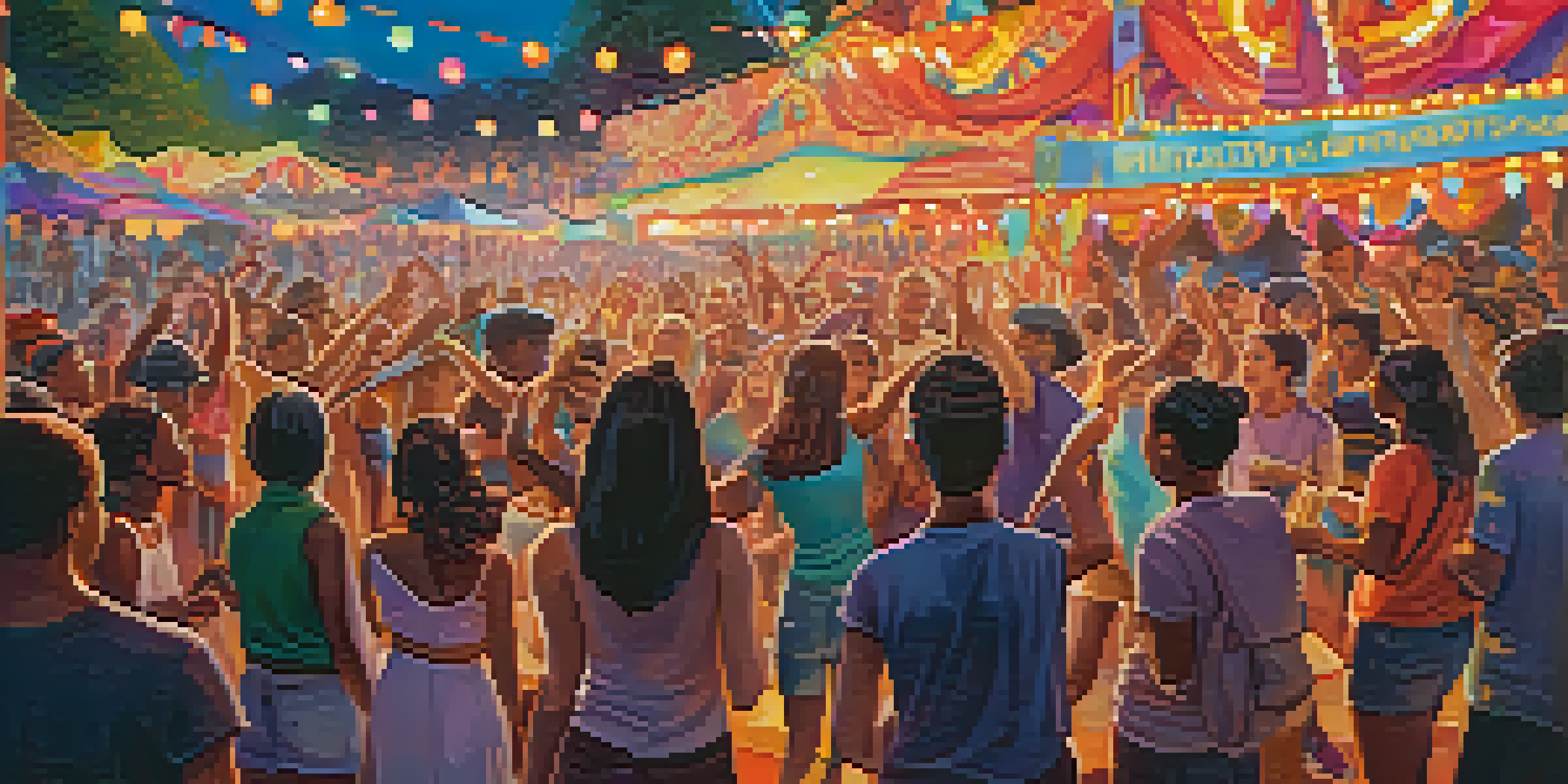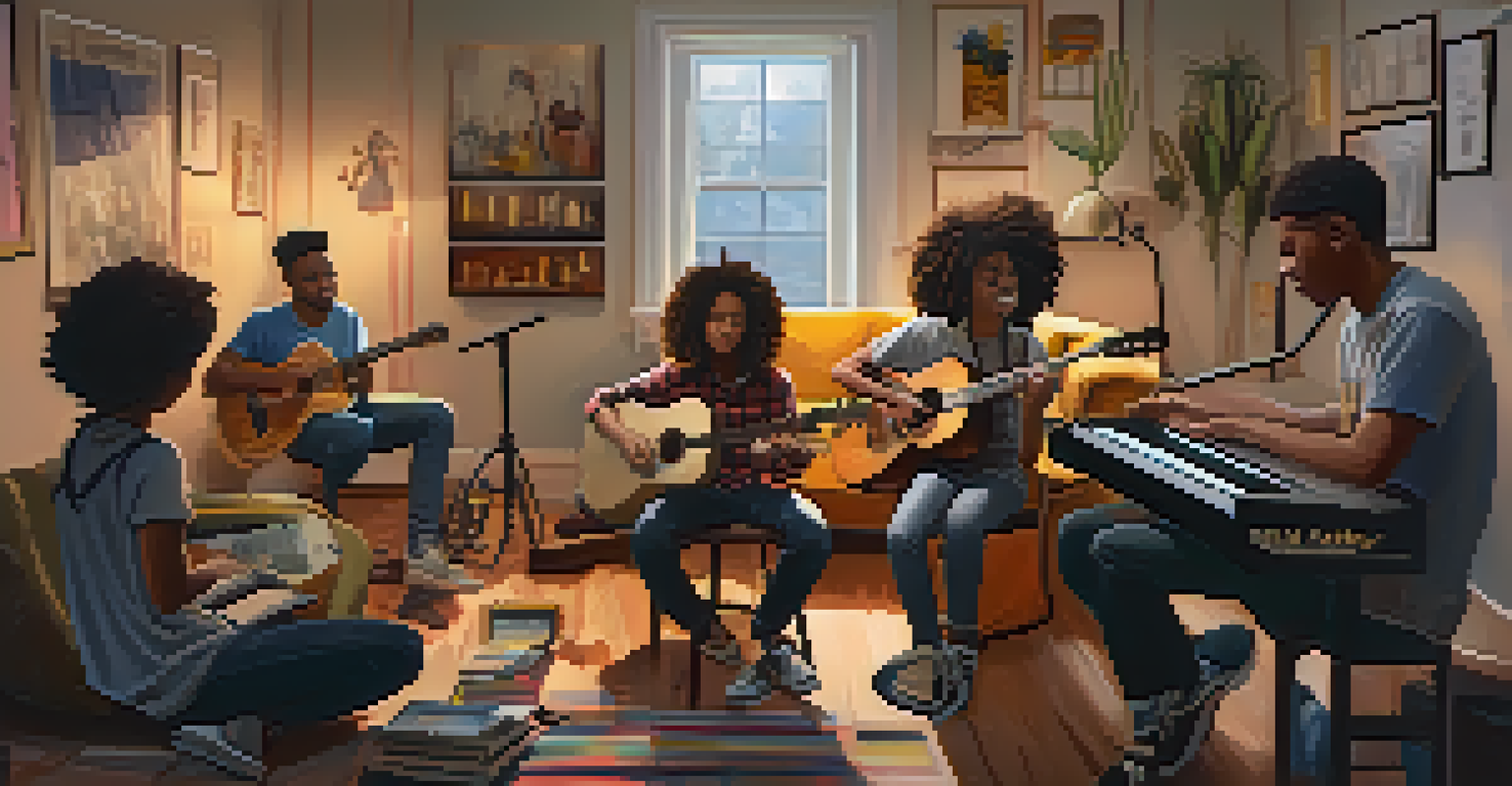Music as a Tool for Youth Self-Expression

The Universal Language of Music in Youth Culture
Music serves as a universal language, transcending barriers and connecting individuals from different backgrounds. For many young people, it becomes a vital form of expression, allowing them to communicate emotions that words sometimes fail to capture. From pop to hip-hop, genres reflect their experiences, creating a sense of belonging in a world that often feels isolating.
Music can change the world because it can change people.
Think of music as a canvas where youth paint their feelings, using rhythms and melodies to convey their inner thoughts. This artistic outlet can be profoundly therapeutic, offering a safe space to explore complex emotions like anger, joy, or sadness. By engaging with music, they not only express themselves but also foster connections with peers who share similar sentiments.
Moreover, music often resonates with the struggles and triumphs of youth, making it an integral part of their identity. When young people hear lyrics that mirror their own experiences, it validates their feelings and encourages them to embrace their uniqueness. In this way, music becomes a powerful ally in their journey of self-discovery.
Creating Personal Narratives Through Songwriting
Songwriting offers youth a unique tool to narrate their personal stories, turning abstract feelings into tangible art. By penning lyrics, they can chronicle their experiences, challenges, and aspirations, making sense of their world in a meaningful way. It’s not just about creating music; it’s about crafting an identity.

For example, many young artists find solace in writing about heartbreak, friendship, or social issues, effectively channeling their emotions into their work. This process can be cathartic, allowing them to confront their feelings and gain clarity. It also empowers them to share their truths, fostering a sense of community among listeners who relate to their narratives.
Music as Youth's Universal Language
Music transcends barriers, allowing young people to express emotions and connect with others from diverse backgrounds.
Moreover, the act of songwriting can enhance creativity and critical thinking skills, encouraging young people to think deeply about their experiences. As they weave stories into melodies, they discover their voice and develop confidence in expressing themselves. This is not just music; it’s a journey of self-exploration.
Music as a Means of Social Change and Activism
Throughout history, music has played a crucial role in social movements, and today’s youth continue this tradition. Many young musicians use their art to advocate for change, addressing issues like climate change, inequality, and mental health awareness. This blend of self-expression and activism empowers them to be catalysts for positive social impact.
Without music, life would be a mistake.
For instance, songs that highlight social injustice can inspire listeners to take action and become more engaged in their communities. Youth-driven music festivals and events often serve as platforms for raising awareness about pressing issues. By harnessing the power of music, young people can amplify their voices and rally others around important causes.
Furthermore, this engagement fosters a sense of responsibility and leadership among youth. As they navigate the complexities of the world, music becomes a powerful tool for expressing their hopes and demands. Through song, they not only advocate for themselves but also shape the future they wish to see.
The Therapeutic Benefits of Music for Emotional Well-Being
Engaging with music can significantly improve mental health and emotional well-being among youth. Studies have shown that listening to or creating music can reduce anxiety, boost mood, and foster a sense of belonging. This therapeutic aspect of music makes it an invaluable resource for young people navigating the ups and downs of adolescence.
For many, music becomes a lifeline during tough times, providing comfort and solace. Whether it’s blasting their favorite songs during a study session or writing lyrics during a moment of distress, the connection to music offers a form of emotional release. This ability to cope through music is essential for developing resilience.
Songwriting for Personal Narratives
Through songwriting, youth narrate their personal stories, turning emotions into art and fostering a sense of identity.
Moreover, participating in musical activities, such as joining a band or choir, can enhance social skills and build friendships. Music fosters collaboration and teamwork, helping youth develop a sense of community. This supportive environment further contributes to their emotional well-being, proving that music is not just entertainment but a vital tool for healing.
Building Confidence Through Musical Performance
Performing music, whether in front of friends or on a larger stage, can significantly boost a young person’s confidence. The act of sharing their talents and creativity encourages them to embrace vulnerability, a key element in personal growth. Each performance becomes a stepping stone in their journey towards self-assurance.
Consider how nervousness transforms into exhilaration when a youth performs their song for the first time. This experience not only cultivates confidence in their abilities but also teaches them to cope with performance anxiety. Learning to navigate these feelings is a valuable life skill that extends beyond the stage.
Additionally, the support and applause from peers and audiences can reinforce their sense of achievement. As they receive validation for their hard work, they gain the courage to pursue their passions further. Music, therefore, serves as a powerful vehicle for building self-esteem and encouraging young people to shine.
Fostering Community and Connection Through Music
Music has an incredible ability to bring people together, creating bonds that transcend age and background. For youth, participating in musical groups or attending concerts fosters a sense of community, allowing them to connect with others who share similar interests. This shared passion helps combat feelings of loneliness and isolation.
Think of a local band performing at a community event, where young people gather to enjoy and celebrate music together. These gatherings not only provide entertainment but also create lasting memories and friendships. The connections made through shared musical experiences can be pivotal in a young person’s social development.
Technology Enhances Musical Expression
Digital tools empower young musicians to create, share, and collaborate, making music creation more accessible and inclusive.
Moreover, music can bridge cultural gaps, introducing youth to diverse perspectives and experiences. By exploring various genres and styles, they learn to appreciate differences and celebrate commonalities. In this way, music becomes a powerful tool for fostering understanding and unity among youth.
The Role of Technology in Youth Musical Expression
In today’s digital age, technology has transformed how youth create and share music. With access to various apps and platforms, young people can easily record, produce, and distribute their work to a global audience. This accessibility empowers them to express themselves creatively without traditional barriers.
For instance, platforms like SoundCloud and YouTube allow aspiring musicians to showcase their talent and connect with fans worldwide. This democratization of music has led to a surge of diverse voices and styles, enriching the musical landscape. Young creators can find their niche and build communities around their art.

Furthermore, technology enables collaboration among musicians, regardless of geographical constraints. Virtual jam sessions and online songwriting collaborations encourage creativity and innovation. As youth embrace these tools, they continue to redefine what it means to express themselves through music, making it more inclusive than ever.